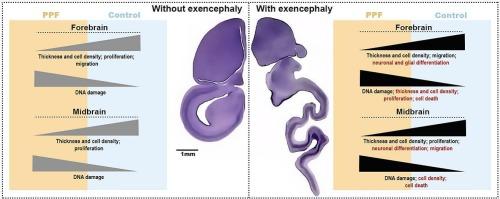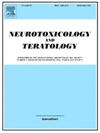Cellular responses to developmental exposure to pyriproxyfen in chicken model: Contrasting embryos with and without exencephaly
IF 2.6
3区 医学
Q3 NEUROSCIENCES
引用次数: 0
Abstract
The insecticide pyriproxyfen (PPF), commonly used in drinking water, has already been described as a potential neurotoxic agent in non-target organisms, particularly during embryonic development. Consequently, exposure to PPF can lead to congenital anomalies in the central nervous system. Therefore, understanding the impact of this insecticide on developing neural cells is a relevant concern that requires attention. Thus, this study aimed to investigate the effects of PPF on the proliferation, differentiation, migration, and cell death of neural cells by comparing embryos that develop exencephaly with normal embryos, after exposure to this insecticide. Chicken embryos, used as a study model, were exposed to concentrations of 0.01 and 10 mg/L PPF on embryonic day E1 and analyzed on embryonic day E10. Exposed embryos received 50 μL of PPF diluted in vehicle solution, and control embryos received exclusively 50 μL of vehicle solution. After exposure, embryos were categorized into control embryos, embryos with exencephaly exposed to PPF, and embryos without exencephaly exposed to PPF. The results showed that although the impact was differentiated in the forebrain and midbrain, both brain vesicles were affected by PPF exposure, and this was observed in embryos with and without exencephaly. The most evident changes observed in embryos with exencephaly were DNA damage accompanied by alterations in cell proliferation, increased apoptosis, and reduced neural differentiation and migration. Embryos without exencephaly showed DNA damage and reduced cell proliferation and migration. These cellular events directly interfered with the density and thickness of neural cell layers. Together, these results suggest that PPF exposure causes cellular damage during neurogenesis, regardless of whether embryos display or do not display external normal morphology. This nuanced understanding provides important insights into the neurotoxicity of PPF and its potential effects on inherent events in neurogenesis.

鸡模型发育过程中暴露于吡丙醚的细胞反应:有无无脑畸形胚胎的对比。
饮用水中常用的杀虫剂吡虫啉(PPF)已被描述为对非目标生物具有潜在的神经毒性,尤其是在胚胎发育期间。因此,接触 PPF 可导致中枢神经系统(CNS)先天性异常。因此,了解这种杀虫剂对发育中神经细胞的影响是一个需要关注的相关问题。因此,本研究旨在通过比较发生无脑畸形的胚胎和正常胚胎,研究 PPF 对神经细胞增殖、分化、迁移和细胞死亡的影响。鸡胚胎作为研究模型,在胚胎 E1 天接触浓度为 0.01 和 10 mg/L 的 PPF,并在胚胎 E10 天进行分析。暴露的胚胎接受 50 μL 用载体溶液稀释的 PPF,对照组胚胎则完全接受 50 μL 载体溶液。暴露后,胚胎被分为对照胚胎、暴露于 PPF 的外显子畸形胚胎和未暴露于 PPF 的外显子畸形胚胎。结果表明,虽然影响在前脑和中脑有所分化,但接触 PPF 后,两个脑泡都受到了影响,这在有无畸形的胚胎中都能观察到。在有畸形的胚胎中观察到的最明显的变化是 DNA 损伤,同时伴有细胞增殖的改变、细胞凋亡的增加以及神经分化和迁移的减少。无外显子畸形的胚胎则表现为 DNA 损伤、细胞增殖和迁移减少。这些细胞事件直接干扰了神经细胞层的密度和厚度。这些结果表明,无论胚胎是否显示出外部正常形态,暴露于 PPF 都会在神经发生过程中造成细胞损伤。这种细致入微的理解为了解 PPF 的神经毒性及其对神经发生过程中固有事件的潜在影响提供了重要启示。
本文章由计算机程序翻译,如有差异,请以英文原文为准。
求助全文
约1分钟内获得全文
求助全文
来源期刊
CiteScore
5.60
自引率
10.30%
发文量
48
审稿时长
58 days
期刊介绍:
Neurotoxicology and Teratology provides a forum for publishing new information regarding the effects of chemical and physical agents on the developing, adult or aging nervous system. In this context, the fields of neurotoxicology and teratology include studies of agent-induced alterations of nervous system function, with a focus on behavioral outcomes and their underlying physiological and neurochemical mechanisms. The Journal publishes original, peer-reviewed Research Reports of experimental, clinical, and epidemiological studies that address the neurotoxicity and/or functional teratology of pesticides, solvents, heavy metals, nanomaterials, organometals, industrial compounds, mixtures, drugs of abuse, pharmaceuticals, animal and plant toxins, atmospheric reaction products, and physical agents such as radiation and noise. These reports include traditional mammalian neurotoxicology experiments, human studies, studies using non-mammalian animal models, and mechanistic studies in vivo or in vitro. Special Issues, Reviews, Commentaries, Meeting Reports, and Symposium Papers provide timely updates on areas that have reached a critical point of synthesis, on aspects of a scientific field undergoing rapid change, or on areas that present special methodological or interpretive problems. Theoretical Articles address concepts and potential mechanisms underlying actions of agents of interest in the nervous system. The Journal also publishes Brief Communications that concisely describe a new method, technique, apparatus, or experimental result.

 求助内容:
求助内容: 应助结果提醒方式:
应助结果提醒方式:


